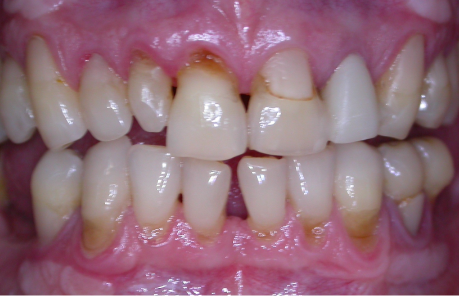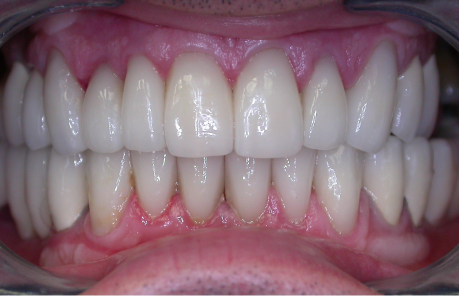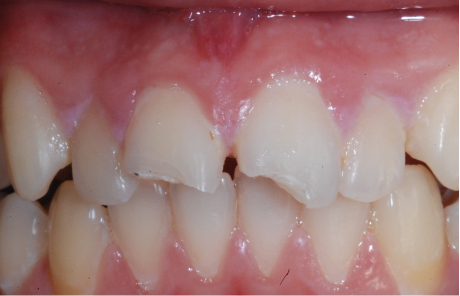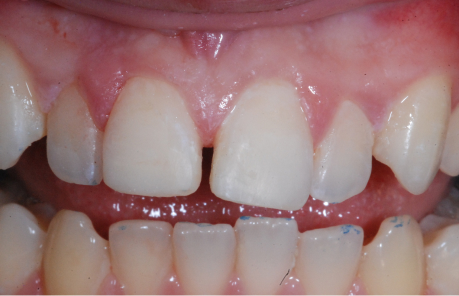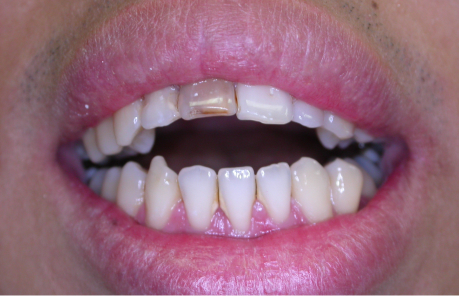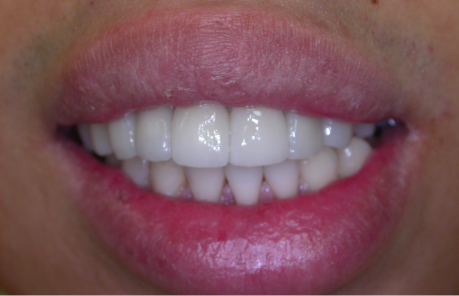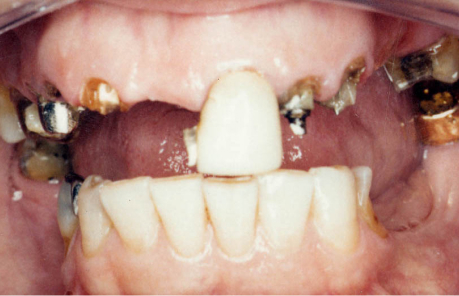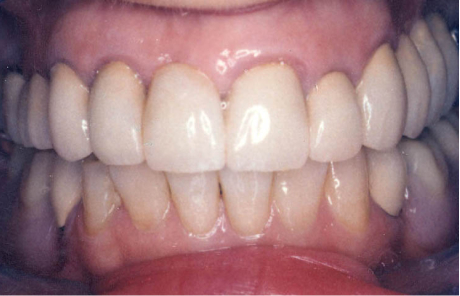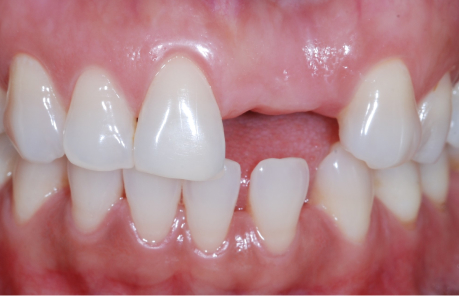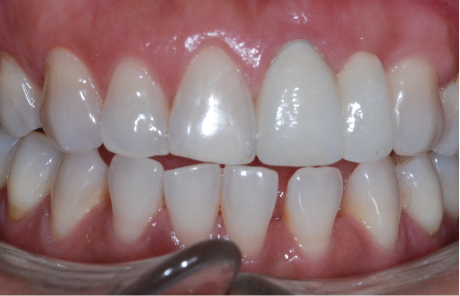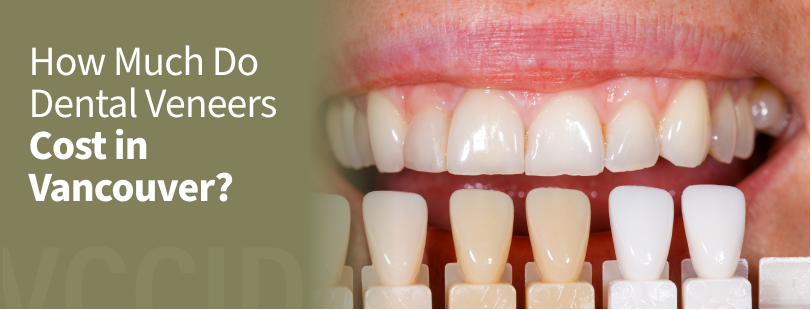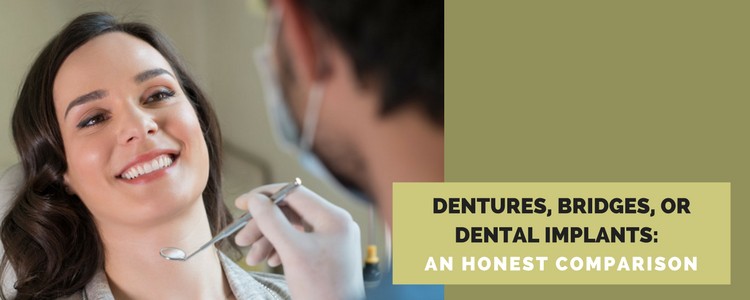What Are Dental Crowns?
According to the Canadian Dental Association, a dental crown is a “hollow, artificial tooth” that covers a damaged or decayed tooth. It is also known as a dental cap. This covering can protect a damaged tooth, prevent future wear and tear, reshape a misshapen tooth, or improve the appearance of a discolored tooth.
Crowns are a popular choice for dental patients because they look and function much like a natural tooth. Crowns restore everything about the tooth that is currently lacking, whether it is worn and needs its size restored, or if it’s weak and needs reinforcement. From the dentist’s point of view, the benefit of crowns is their ability to restore a broken tooth; to function and prevent further wear, breakage and possible loss of the tooth.
What Are Dental Crowns Made Of?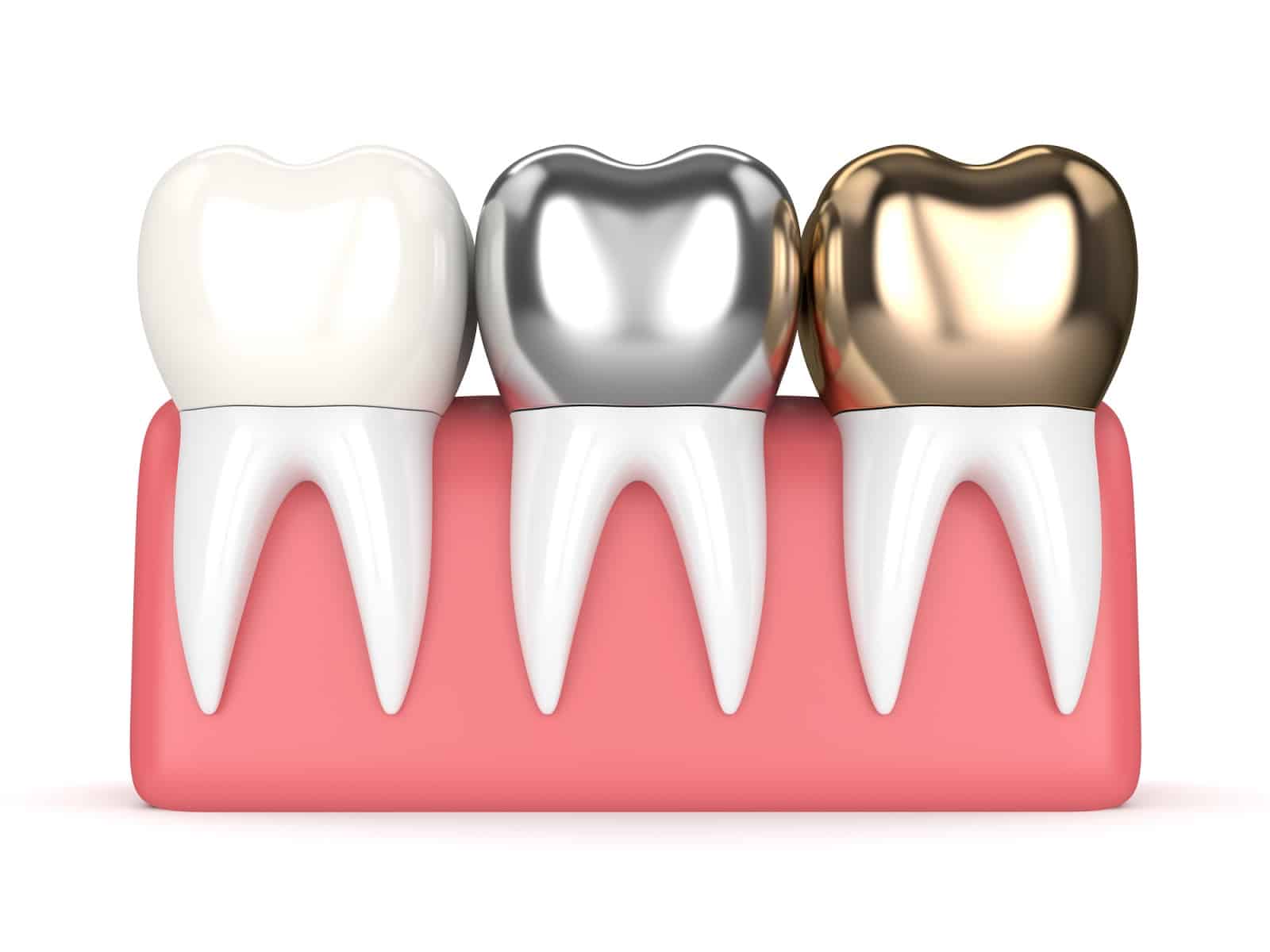
Crowns can be made of different materials such as stainless steel, porcelain, ceramic, metal alloys, and acrylics (plastics). Every material has different advantages. Full metal crowns (ie gold or stainless steel) are the strongest in that the metal will not chip or break; however, because of the esthetics, they tend to be used mainly for the back teeth where there is a lot of function.
Porcelain Crowns
Porcelain and porcelain-metal combinations match the color of teeth, but they are weaker than metal and even weaker than our own natural enamel.
These types of crowns can still last a long time (10-20+ years) even though the porcelain is weaker. It is not uncommon to have some chipping of the porcelain during this time. As long as the chip is minor and does not affect the esthetics or integrity of the tooth or crown, these small fractures can be polished and smoothed, thereby prolonging the life of the crown.
Resin Crowns
Resin dental crowns are often the least expensive but wear down more quickly than porcelain or ceramic crowns. These are mainly used for temporary purposes, either while a final crown is being made or as a temporary solution while another treatment is being done prior to making the final crowns. Stainless steel is also relatively inexpensive as the material is less expensive and they are prefabricated in standard sizes.
These are most commonly seen on children’s primary teeth as a solution to save these teeth for spacing and functional reasons until the new permanent teeth have developed enough to erupt.
Ceramic Crowns
The biggest change in materials over the last ~50 years has been in dental ceramics. Different materials have been developed and used in the past in order to discover the ideal combination of strength, esthetics, durability, and cost.
Most all-porcelain systems in the past excelled in some but not all of the required characteristics. Today we have a wide variety of porcelain systems and each is valuable when used in the ideal situation. In my opinion, the two ceramic materials that come closest to fitting all the parameters is Emax (lithium disilicate structure) and Zirconium (zirconium oxide structure).
Dental crowns can cost between $1,000 to $2,400 per tooth in Vancouver, BC. To find out more information on the cost of dental crowns in Vancouver and if crowns are worth the investment, read our post on ‘How Much Do Dental Crowns Cost In Vancouver?’
Getting a Crown
The process of getting a crown usually only requires 2-3 visits and a short wait time (assuming the crown is being made by an “outside” laboratory). Your dentist will need to clean up the tooth to ensure it’s free from decay and solid enough to retain the crown.
Then the tooth will need to be reshaped in order to provide enough thickness for the material being used and to provide the ideal shape to hold/retain the crown. An impression (either digital or using impression material) of the tooth is made. This is used to design and build your new crown. that is similar to the one that needs to be treated.
While the final crown is being made, the dentist will place a temporary crown over the tooth. This protects the tooth until the final crown is ready.
On the next visit, the temporary crown will be removed and the permanent one will be fitted. The dentist will check to make sure the crown is the right fit, shape, color, and functions according to your bite. If everything looks good, it will be cemented into place.
These are the steps dentists usually follow in making a crown, but in some instances, your tooth may need additional treatment prior to the crown. It may be orthodontic treatment, gum care, or a root canal, etc. If so you may need more visits to make conditions right before getting a dental crown.
When Are Dental Crowns Used?
Dental crowns can resolve a wide range of problematic situations. They are incredibly valuable to patients because they can save a tooth or restore the function of a lost tooth. No matter what the reason, dental crowns can improve the quality of life/function for the recipient. Here are some reasons why people get dental crowns.
- Tooth Decay: Decayed teeth are often weakened (and can fracture) due to the loss of natural tooth structure. Crowns can improve the strength of the tooth allowing you to chew normally with no or a reduced risk of further fracture.
- Cracked Teeth: When a tooth is cracked or fractured due to injury, a crown can be used to “rebuild” it.
- Worn down or misshapen teeth: If a tooth is severely worn down or chipped, a crown can cover these weak areas to either prevent further chipping and/or restore the proper mass/size/length to the tooth.
- Missing teeth: When a tooth is completely gone, crowns can be used as abutments (supports) for a permanent bridge (replaces the missing tooth). They can also be attached to dental implants and serve as a great tooth replacement.
- Tooth discoloration: When a tooth is too discolored or unesthetic to be corrected with other methods, a crown (or possibly porcelain veneer) can cover these defects and restore the beauty of the tooth.
- Pediatric dental issues: If any of a child’s first set of teeth is failing, temporary stainless steel or acrylic crown can preserve the tooth until the adult teeth come in. This is an appropriate solution since children acquire a new set of stronger teeth in a few years.
How Long Do Dental Crowns Last?
Dental crowns last an average of between 5-15 years, however, I have seen many crowns last 25+ years. The longest I have personally seen was 45 years old! Their lifespan depends greatly on the material of the crown. As well as the level of wear and tear; how well the patient cares for them, and how much trauma the crown faces regularly.
Preventive measure to maximize the life of a dental crown –
- Avoid eating hard or sticky foods that can cause damage to the crown.
- Get a mouth card to protect your crowns from extra wear and tear, especially if you grind your teeth while sleeping
- Practice good oral hygiene to prevent tooth decay and gum disease
What Causes a Dental Crown to Fail?
The most common reason a crown fails is either decay or fracture of the material. A crown typically covers and protects most of the tooth surface, the edge of the crown is near the gum-line.
If dental plaque accumulates in these areas the tooth surface beyond the crown can decay. The decay can get under the crown and compromise the crown and tooth. As mentioned above, porcelains are not as strong as tooth enamel. A failure may be due to material failure which means repacing the crown.
Other reasons for failure are not necessarily a fault of the crowns as opposed to failure of the tooth or gum tissue. Gum disease is an infection of the gum and bone tissue; it will cause an entire tooth to fail, despite having a perfectly good crown. In other cases, the tooth or the root structure of a crowned tooth will fracture. Depending on the nature of the problem it may require removal of the tooth.
For the above reasons, prior to recommending or making a crown, your dentist will evaluate your tooth. This determines if your tooth is restorable and if there are any other issues that need to be addressed. It is in both your and your dentist’s best interest to provide a solution that will give you the best long term function and value.
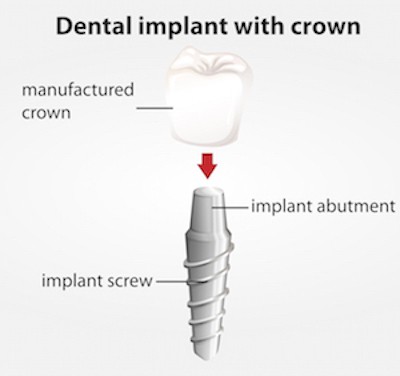
What Are The Alternatives To Getting A Dental Crown?
Depending on the condition of the tooth there may not be any good alternatives. It may be possible to do a filling. But usually, a crown has been recommended because the structure of the tooth is compromised. A filling can be used to rebuild the tooth. It won’t have the strength to withstand chewing or prevent the rest of the tooth from breaking.
In some cases where there are concerns regarding the strength of one part or side of a tooth but the remainder is still quite intact. A more conservative solution called an onlay may be feasible. These are variations on traditional dental crowns. The biggest difference is how much tooth area they cover; as well as how much of the tooth needs to be prepared. And not to confuse you, there are other restorations called inlays. These are essentially an alternative to fillings, but not an alternative to crowns or onlays.
Inlay: This is also called an indirect filling. Inlays are made much like a crown. They are stronger than composite fillings and hence are made as a quality, long term solution; compared to traditional filling materials. Unlike traditional crowns or onlays, inlays do not cover the cusps of teeth.
Onlay: Also known as a partial dental crown (or a 3/4 dental crown), this covers a segment of the tooth instead of the whole tooth.
These are best used on teeth that can need some strengthening. Yet, at the same time is more conservative in regards to the amount of tooth that needs to be prepared.
While crowns are still a great dental treatment, it is good to explore these less-invasive alternatives. If you qualify, you can strengthen your teeth and restore their function with the same results; with less downtime and cost to you.
Contact Us to Learn More About Dental Crowns
Dental crowns are an excellent way to preserve a damaged tooth and improve its aesthetic appearance. It’s best to meet with your dentist to determine whether or not dental crowns are right for you. Contact us or visit our dental clinic in Metrotown to schedule an appointment today.

